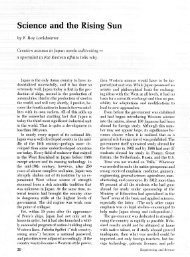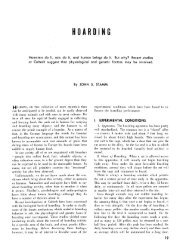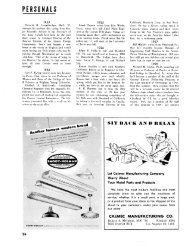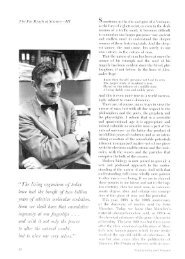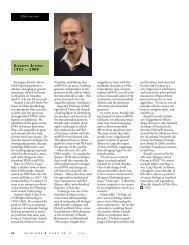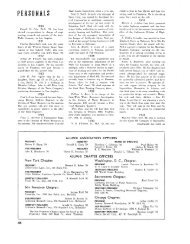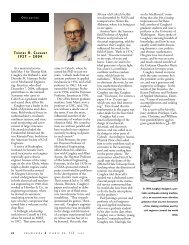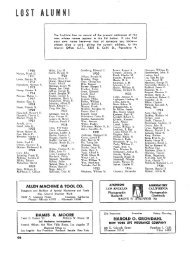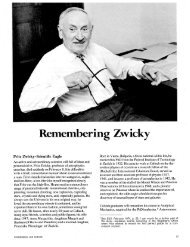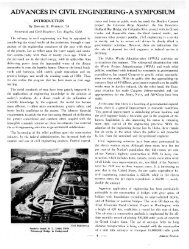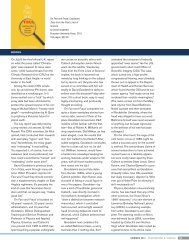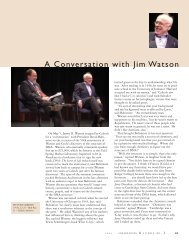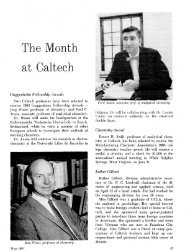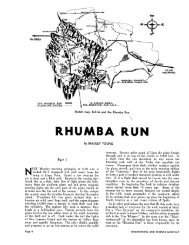published at the california institute of technology - Engineering ...
published at the california institute of technology - Engineering ...
published at the california institute of technology - Engineering ...
Create successful ePaper yourself
Turn your PDF publications into a flip-book with our unique Google optimized e-Paper software.
probably been <strong>the</strong> main agent responsible for <strong>the</strong><br />
astonishingly rapid development in human life and<br />
society in <strong>the</strong> last 10,000 years. Future changes<br />
in human life promise fur<strong>the</strong>r improvements in<br />
<strong>the</strong> extracorporeal inform<strong>at</strong>ion store and in its use.<br />
"As we understand life, we can control life," re-<br />
marked Caltech pr<strong>of</strong>essor <strong>of</strong> biophysics Robert Sin-<br />
sheimer in opening <strong>the</strong> afternoon session. This un-<br />
derstanding is increasing with astonishing rapidity.<br />
How far will it go? We can now assume th<strong>at</strong> we will<br />
eventually cre<strong>at</strong>e a self-reproducing cell. On <strong>the</strong><br />
way to this achievement <strong>the</strong> determin<strong>at</strong>ion <strong>of</strong> sex,<br />
<strong>the</strong> control <strong>of</strong> arthritic pain, and genetic <strong>the</strong>rapy for<br />
diabetes are among <strong>the</strong> likely possibilities.<br />
Will mind, sens<strong>at</strong>ion, and consciousness yield<br />
to <strong>the</strong> same analytical approach? Neal E. Miller,<br />
pr<strong>of</strong>essor <strong>of</strong> behavioral sciences <strong>at</strong> Rockefeller Uni-<br />
versity, suggested th<strong>at</strong> human behavior is subject<br />
to n<strong>at</strong>ural laws and susceptible to scientific study.<br />
If we are able, ei<strong>the</strong>r through <strong>the</strong> analysis <strong>of</strong> human<br />
behavior or through <strong>the</strong> study <strong>of</strong> <strong>the</strong> human brain,<br />
to understand <strong>the</strong>se mysteries, we will face some<br />
awesome choices. But, as Sinsheimer noted, it may<br />
be th<strong>at</strong> we have no choice, but are just "passengers<br />
on a fantastic street-car called evolution."<br />
Robert Morison, director <strong>of</strong> <strong>the</strong> division <strong>of</strong> bio-<br />
logical sciences <strong>at</strong> Cornell, pointed out some <strong>of</strong> <strong>the</strong><br />
ways in which scientific progress is already dras-<br />
tically changing traditional social p<strong>at</strong>terns. In re-<br />
gard to <strong>the</strong> transfer <strong>of</strong> inform<strong>at</strong>ion, for example, <strong>the</strong><br />
family is already losing its traditional role as <strong>the</strong><br />
main repository <strong>of</strong> knowledge in society. It may<br />
well lose much <strong>of</strong> its biological function too. How<br />
will our social institutions evolve to accommod<strong>at</strong>e<br />
<strong>the</strong>mselves to new conditions?<br />
On Thursday morning Asa Briggs, dean <strong>of</strong> <strong>the</strong><br />
school <strong>of</strong> social studies <strong>at</strong> <strong>the</strong> University <strong>of</strong> Sussex,<br />
England, added historical perspective to <strong>the</strong>se pro-<br />
phetic flights by describing how in 1850 and again<br />
in 1900 men looked <strong>at</strong> <strong>the</strong>ir past and prophesied<br />
<strong>the</strong>ir future. Noting <strong>the</strong> prediction in 1900 th<strong>at</strong><br />
phrenology would be <strong>the</strong> science <strong>of</strong> <strong>the</strong> future, he<br />
pointed up <strong>the</strong> difficulty <strong>of</strong> distinguishing between<br />
fruitful p<strong>at</strong>hs <strong>of</strong> enquiry and <strong>the</strong> blind alleys <strong>of</strong><br />
human curiosity. He suggested th<strong>at</strong> <strong>the</strong> university<br />
was a proper vantage point from which to review<br />
our prospects in 1966.<br />
Daniel Bell, pr<strong>of</strong>essor <strong>of</strong> sociology <strong>at</strong> Columbia,<br />
went even fur<strong>the</strong>r in stressing <strong>the</strong> role <strong>of</strong> <strong>the</strong> uni-<br />
versity. Characterizing our contemporary "post-in-<br />
dustrial" society as one in which white-collar work-<br />
ers outnumber blue-collar workers, he envisioned a<br />
significant shift in <strong>the</strong> power structure from <strong>the</strong><br />
empirical to <strong>the</strong> <strong>the</strong>oretical. When this change takes<br />
place, Bell suggested, <strong>the</strong> university will become<br />
<strong>the</strong> primary institution <strong>of</strong> a new society.<br />
Herbert J. Muller, pr<strong>of</strong>essor <strong>of</strong> English and gov-<br />
ernment <strong>at</strong> <strong>the</strong> University <strong>of</strong> Indiana, asserted th<strong>at</strong><br />
<strong>the</strong>re is a basis for decisions th<strong>at</strong> will have to be<br />
made, pointing out th<strong>at</strong> while values are "scienti-<br />
fically unchaste," scientist and humanist both ac-<br />
cept as absolute values such things as health, phys-<br />
ical well-being, play, comradeliness; and <strong>the</strong> s<strong>at</strong>is-<br />
faction <strong>of</strong> <strong>the</strong> aes<strong>the</strong>tic sense, cre<strong>at</strong>ive impulse, and<br />
n<strong>at</strong>ural curiosity. These values, he said, will exist as<br />
long as we assume th<strong>at</strong> human existence is worth-<br />
while. Never<strong>the</strong>less, <strong>the</strong> power th<strong>at</strong> modern tech-<br />
nology has given man is infinitely gre<strong>at</strong>er than ever<br />
before, and exercise <strong>of</strong> th<strong>at</strong> power has too <strong>of</strong>ten not<br />
been responsive to those values. Can we direct our<br />
<strong>technology</strong> to truly civilized, humane ends?<br />
A discussion on Thursday afternoon had Don K.<br />
Price, dean <strong>of</strong> <strong>the</strong> Harvard gradu<strong>at</strong>e school <strong>of</strong> pub-<br />
lic administr<strong>at</strong>ion; James Bonner, Caltech pr<strong>of</strong>essor<br />
<strong>of</strong> biology; Murray Gell-Mann; Carl Kaysen, direc-<br />
tor <strong>of</strong> <strong>the</strong> Institute for Advanced Study; and Simon<br />
Ramo, vice-chairman <strong>of</strong> TRW, Inc., trying to define<br />
some <strong>of</strong> <strong>the</strong> ramific<strong>at</strong>ions <strong>of</strong> technological progress.<br />
They concluded th<strong>at</strong> man's social <strong>at</strong>titudes would<br />
have to be reorganized in <strong>the</strong> next few years and<br />
agreed th<strong>at</strong> new decision-making agencies must be<br />
developed to cope with future problems in deter-<br />
mining public policy. It may be th<strong>at</strong> <strong>the</strong> university,<br />
which oper<strong>at</strong>es within demanding self-imposed<br />
rules th<strong>at</strong> do <strong>at</strong>tempt to recognize primary human<br />
values, will provide <strong>the</strong> model for <strong>the</strong> decision-mak-<br />
ing institutions <strong>of</strong> <strong>the</strong> future.<br />
The closing session on Thursday evening dealt<br />
with <strong>the</strong> specific problem <strong>of</strong> how formal educ<strong>at</strong>ion<br />
will have to adapt itself to <strong>the</strong> kind <strong>of</strong> world <strong>the</strong><br />
o<strong>the</strong>r speakers foresaw. Lord James <strong>of</strong> Rusholme,<br />
vice-chancellor <strong>of</strong> <strong>the</strong> University <strong>of</strong> York, England,<br />
saw science outstripping o<strong>the</strong>r fields, with a result-<br />
ing alien<strong>at</strong>ion between scientist and non-scientist.<br />
He foresaw <strong>the</strong> gre<strong>at</strong>est problem <strong>of</strong> this alien<strong>at</strong>ion<br />
as overcoming growing specializ<strong>at</strong>ion in science-<br />
a specializ<strong>at</strong>ion which cripples <strong>the</strong> scientist in o<strong>the</strong>r<br />
fields. To overcome this limit<strong>at</strong>ion he suggests a<br />
more general, even superficial, educ<strong>at</strong>ion for <strong>the</strong><br />
scientist in non-scientific fields, and a broader ex-<br />
posure to science for <strong>the</strong> non-scientist to prepare<br />
him to live in a scientific world. To implement this<br />
new kind <strong>of</strong> educ<strong>at</strong>ion, more and better teachers-<br />
people who consider teaching and self-educ<strong>at</strong>ion<br />
<strong>the</strong>ir primary job-are needed. "In <strong>the</strong> last resort, if<br />
our educ<strong>at</strong>ion is to get better, as it must, it will get<br />
better because it is carried on by more educ<strong>at</strong>ed,<br />
more sensitive, and more humane people who are<br />
not afraid to emphasize <strong>the</strong> social relevance <strong>of</strong> <strong>the</strong><br />
subjects <strong>the</strong>y teach."<br />
<strong>Engineering</strong> and Science



